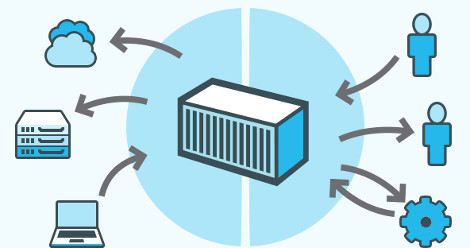Docker Containers Coming to Windows Server
Expanded Microsoft-Docker relationship includes integration of Docker Hub with Azure
October 15, 2014

Docker and Microsoft have partnered to bring Docker’s open platform for distributed applications to a future release of Windows Server. So far, Docker has only supported Linux, but Docker CEO Ben Golub told Data Center Knowledge in August that support for Windows was in the pipeline.
Docker Hub, the company's online repository of Docker images, will also be integrated into Microsoft Azure directly through the Azure Management Portal and Azure Gallery.
Docker Engine, the open source runtime that builds, runs and orchestrates Docker containers, will work with the next Windows Server release, the companies said. Docker is an open-source engine that automates the deployment of any application as a portable, self-sufficient container that will run almost anywhere, such as data centers and clouds.
Docker has seen a lot of interest from developers, organizations, and tech giants wishing to ensure it is compatible with their offerings. VMware, Google and Pivotal teamed up to bring Docker to the enterprise. Microsoft integrated Kubernetes into its Azure cloud in August. Kubernetes, an open source Google project, helps manage deployment of workloads packaged in Docker containers.
Docker Engine Images for Windows Server will be available in the Docker Hub, a community and repository with more than 45,000 Docker applications.
Docker Hub integration with Azure will allow Microsoft’s ecosystem of Independent Software Vendors and cloud developers to access the work of Docker’s community to further innovate on both Windows Server and Linux.
“The strength of Windows Server in the enterprise makes its inclusion into the Docker project a watershed event for the Docker community and ecosystem,” said Solomon Hykes, CTO and founder of Docker. “Creating a common approach and user interface for containerization and distributed applications will catalyze a new wave of applications that will be transformative across all organizations.”
Microsoft is also contributing to Docker’s open orchestration APIs to help ensure portability for multi-container applications. Developers are able to directly work with pre-configured Docker Engine in Azure to create multi-container Dockerized applications.
“The power of Azure and Windows Server leveraging the Docker platform redefines what enterprises should expect and demand from their cloud,” Golub said. “Together, we will provide a framework for building multi-platform distributed applications that can be created with exceptional velocity and deployed and scaled globally.”
“We recognize the importance of providing flexibility to our customers as they look to innovate in this mobile-first, cloud-first world,” said Scott Guthrie, executive vice president of Cloud and Enterprise at Microsoft. “To deliver this flexibility, we are already providing first-class support for Docker and Linux on our rapidly growing cloud platform, Microsoft Azure. Today, our partnership with Docker further deepens our commitment to help create an open platform powered by choice, bringing together Windows Server and Linux to drive application innovation.”
About the Author
You May Also Like

.jpg?width=300&auto=webp&quality=80&disable=upscale)





